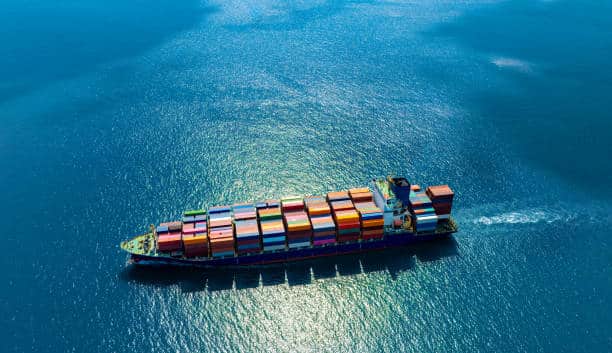
Shipping from China to Nigeria? Discover the best air freight, ocean freight, and express shipping options. Learn about transit times, costs, customs clearance, and the most efficient ways to ship goods from China to Nigeria. Whether you’re a business or an individual, find the right shipping solution for your needs.
Freight Shipping Cost from China to Nigeria

Overview of Costs by Shipping Mode
Below are the estimated costs for different shipping methods from China to Nigeria, depending on shipment size and urgency:
| Shipping Mode | Description | Estimated Cost Range |
| LCL (Less than Container Load) | Suitable for smaller shipments that do not require a full container. | $95 per cubic meter |
| FCL (20-foot container) | Best for large shipments that fill an entire 20-foot container. | $1,250 |
| FCL (40-foot container) | Ideal for bulk shipments requiring a full 40-foot container. | $1,400 |
| Express Shipping | The fastest option for urgent shipments, priced based on weight. | Starting at $5 per kilogram |
| Air Freight | A balance between cost and speed, ideal for time-sensitive shipments. | $6.2 per kilogram |
Estimating Shipping Costs and Effective Budgeting
Accurate cost estimation and financial planning require a well-structured approach:
- Use online shipping calculators for preliminary cost estimates, but request detailed quotes for precise pricing.
- Allocate an additional 10-15% buffer in your budget to cover potential delays, unforeseen charges, and additional fees.
- Regularly review actual shipping expenses against initial estimates to improve future budgeting strategies.
For example, if a full container load costs $2,400, setting aside up to $2,760 ensures readiness for unexpected costs, avoiding financial shortfalls.
Understanding Import Tax and Duties

Impact of Import Taxes on Overall Shipping Costs
Import taxes and duties play a significant role in determining the total cost of shipping goods from China to Nigeria. Nigeria’s Value-Added Tax (VAT) is set at 7.5%, while customs duties vary depending on the product category as classified under the Harmonized System (HS).
For example, electronic goods may incur customs duties of up to 25%, making it crucial to factor these costs into your budget.
| Product Category | Customs Duty | VAT (7.5%) | Total Tax Impact |
| Electronics | 25% | 7.5% | 32.5% |
| Clothing | 35% | 7.5% | 42.5% |
| Machinery | 10% | 7.5% | 17.5% |
| Automotive Parts | 20% | 7.5% | 27.5% |
| Agricultural Products | 0% | 7.5% | 7.5% |
Navigating Legal Compliance in International Shipping
Ensuring compliance with Nigerian import regulations is critical to avoid penalties and delays. Key considerations include:
- Properly classifying goods to determine applicable duty rates.
- Accurately declaring the value of goods for correct tax assessments.
- Preparing essential documentation, such as the Bill of Lading, Commercial Invoice, and any required permits.
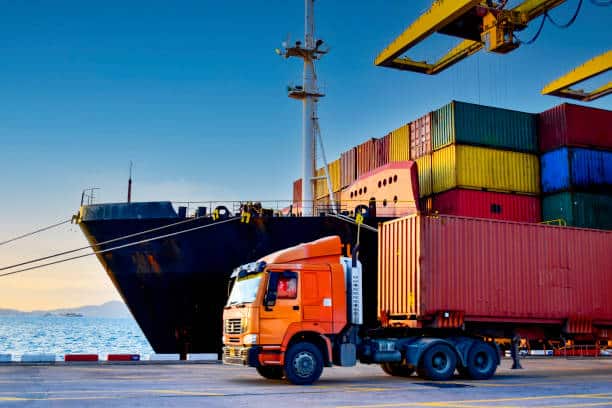
Working with experienced freight forwarders can simplify the customs clearance process, ensuring full compliance and smooth logistics operations.
Shipping from China to Nigeria: Transit Times

When planning shipments from China to Nigeria, it is important to understand the estimated transit times for various shipping methods:
| Shipping Mode | Average Transit Time | Key Factors Affecting Transit Time | Mitigation Strategies |
| Sea Freight (LCL) | 18 to 20 days | Weather conditions, port congestion | Opt for FCL to minimize delays, plan shipments in advance |
| Sea Freight (FCL) | 18 to 20 days | Port congestion | Book shipments early, use reliable carriers |
| Air Freight | 4 to 6 days | Weather conditions, customs clearance delays | Ensure accurate documentation, work with experienced freight forwarders |
| Express Shipping | 7 to 10 days | Customs processing delays | Choose premium express services, streamline customs clearance |
For example, an FCL shipment departing from Shanghai may take up to 35 days to reach Lagos, making it an ideal option for bulk shipments that are not time-sensitive.
Transit Times by Shipping Mode
Several external factors can impact the reliability and efficiency of shipping timelines:
- Weather conditions can cause major delays, especially for sea and air freight.
- Port congestion in both China and Nigeria may extend transit times by days or even weeks.
- Customs clearance delays due to incorrect or incomplete documentation can affect all shipping methods.
- Logistics efficiency, including the reliability of freight forwarders and carriers, plays a crucial role in ensuring timely deliveries.

Mitigating Factors Affecting Transit Times
To minimize shipping delays and ensure timely deliveries:
- Choose air freight for time-sensitive shipments to avoid longer transit times associated with sea freight.
- Partner with reliable freight forwarders who have strong systems in place to handle customs procedures and unexpected delays.
- Ensure all shipping documentation is accurate and complete to prevent customs-related hold-ups.

By selecting the most suitable shipping method and proactively preparing for potential delays, businesses can improve logistics efficiency and ensure that goods arrive in Nigeria within the expected timeframe.
Door to Door Shipping from China to Nigeria

Advantages of Door-to-Door Services
Door-to-door shipping from China to Nigeria provides a seamless logistics solution by reducing handling, optimizing delivery times, and eliminating the need for businesses to coordinate different stages of the shipping process. This comprehensive service simplifies international trade and ensures greater efficiency.
Benefits of Door-to-Door Shipping
- Streamlined Logistics: Eliminates the complexity of working with multiple logistics providers, offering a single point of contact for the entire shipping process.
- Reduced Handling: Direct shipment from the supplier to the recipient minimizes the risk of damage or loss, improving product safety.
- Faster Delivery: Optimized routing and handling help reduce transit times, making this an attractive option for businesses looking to enhance supply chain efficiency.

Choosing the Right Door-to-Door Service
When selecting a door-to-door shipping provider from China to Nigeria, businesses should assess key factors such as reliability, cost, service coverage, and customs expertise.
- Reliability: Ensure timely deliveries by choosing providers with strong service records and positive customer feedback.
- Cost: Compare service quotes to secure competitive pricing without compromising service quality.
- Service Coverage: Verify that the provider can handle shipments from the pickup location in China to the final delivery destination in Nigeria.
- Customs and Regulatory Expertise: Select a provider with in-depth knowledge of customs regulations in both countries to ensure smooth clearance and avoid unnecessary delays.

By carefully evaluating these factors, businesses can select the most efficient and cost-effective door-to-door shipping solution for their needs.
Sea Freight from China to Nigeria
| Shipping Option | Estimated Cost | Average Transit Time |
| LCL (Less than Container Load) | $50 to $70 per cubic meter | 40 to 60 days |
| FCL (20-foot container) | $1,250 | 18 to 20 days |
| FCL (40-foot container) | $1,400 | 18 to 20 days |
Benefits of LCL and FCL Shipping
- LCL Shipping: Ideal for smaller shipments, LCL allows businesses to pay only for the space they use. The estimated cost for LCL shipping from Shanghai to Lagos ranges between $50 and $70 per cubic meter, with transit times typically ranging from 40 to 60 days. The total duration depends on factors such as consolidation and deconsolidation at various ports.
- FCL Shipping: Best suited for larger shipments, FCL provides an exclusive container for a single shipper’s goods. A standard 20-foot container is priced at approximately $1,250, while a 40-foot container costs around $1,400. FCL shipments benefit from faster transit times of 18 to 20 days due to direct shipping and reduced handling.
Selecting a Sea Freight Forwarder and Top Shipping Routes
When selecting a sea freight forwarder, businesses should evaluate not only cost and transit times but also the forwarder’s expertise in handling customs clearance, documentation, and logistics management to avoid delays and complications.
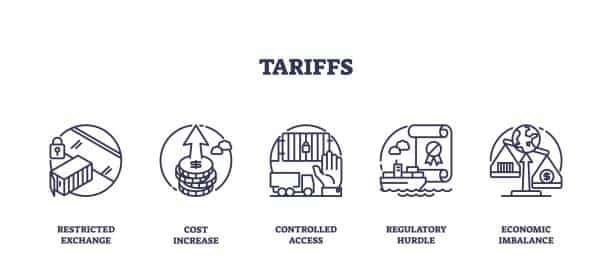
Top Shipping Routes
The most commonly used shipping routes from China to Nigeria involve major departure ports such as Shanghai, Shenzhen, and Ningbo, with Lagos serving as the primary port of arrival.
- Direct shipping routes provide faster transit times but may come at a higher cost.
- Routes with transshipment can reduce costs but often result in extended delivery times due to additional handling at intermediate ports.
For businesses shipping goods from China to Nigeria, understanding these logistics factors and partnering with an experienced freight forwarder can help balance cost, speed, and reliability for an efficient supply chain.
Air Freight from China to Nigeria
| Factor | Detail |
| Average Transit Time | 4 to 6 days |
| Estimated Cost | $6.2 per kilogram for shipments over 1000 kg |
| Key Advantages | Speed, reliability, ideal for time-sensitive shipments |
| Considerations | Higher cost compared to sea freight, best suited for high-value or perishable goods |
| Selecting a Forwarder | Strong network, experience on the China-Nigeria route, customs expertise, and ability to offer competitive rates |
Advantages and Considerations of Air Freight
Air freight is widely preferred for its speed and reliability, offering transit times as short as 4 to 6 days from China to Nigeria. This makes it the ideal option for urgent shipments, high-value goods, or products with a short shelf life, such as pharmaceuticals and electronics.
However, this fast service comes at a higher cost. As of February 2025, the estimated air freight cost is $6.2 per kilogram for shipments over 1000 kg. While significantly more expensive than sea freight, air shipping provides the benefit of expedited delivery, making it essential for businesses handling perishable goods or operating under strict deadlines.
Choosing the Right Air Freight Forwarder
The success of air freight shipping largely depends on selecting the right freight forwarder. A forwarder with a well-established network and extensive experience on the China-Nigeria route can secure better freight rates, typically ranging from $4,500 to $7,000 for a full pallet, depending on seasonal demand and availability.
When evaluating freight forwarders, consider the following:
- Transit Times: Ensure the forwarder can deliver goods within the required timeframe.
- Cost: Look for competitive pricing while ensuring transparency regarding any potential additional fees.
- Customs Expertise: Choose a forwarder well-versed in Nigerian import regulations to prevent delays due to customs clearance issues.
For instance, working with a forwarder who has direct airline partnerships can help reduce transit times and provide more flexible departure schedules, ensuring your shipment arrives in Nigeria on time.
China’s Principal airports
- Beijing Capital International Airport (PEK)
- Shanghai Pudong International Airport (PVG)
- Guangzhou Baiyun International Airport (CAN)
- Shenzhen Bao’an International Airport (SZX)
- Chengdu Shuangliu International Airport (CTU)
Hong Kong’s Principal airports
- Hong Kong International Airport (HKG) (Main and only major airport)
Express Shipping from China to Nigeria
| Feature | Detail |
| Benefits | Speed, reliability, real-time tracking |
| Ideal Use Cases | Time-sensitive shipments, last-minute orders, high-value products |
| Estimated Cost Range | $8 to $15 per kilogram |
| Average Transit Time | 3 to 7 days |
| DDP Option | Simplifies customs clearance, includes all taxes and fees upfront |
Benefits and Use Cases for Express Shipping
Express shipping from China to Nigeria ensures fast and reliable deliveries. It is ideal for:
- Time-sensitive shipments – Crucial for industries like fashion and technology.
- Last-minute orders – Helps businesses quickly restock or fulfill urgent requests.
- High-value products – Secures fast and safe delivery, minimizing risks.
Real-time tracking enhances visibility, providing updates throughout the shipment process.
Understanding Costs and Transit Times, Including DDP Options

Express shipping costs vary based on weight, volume, and urgency, typically ranging from $8 to $15 per kilogram. While more expensive than other options, it ensures quick deliveries, supporting business continuity.
Transit times range from 3 to 7 days, depending on the carrier and service level.
The Delivered Duty Paid (DDP) option includes all customs fees, taxes, and clearance costs, simplifying the shipping process. It ensures a smooth delivery experience by eliminating unexpected charges and delays.
For example, a company importing specialized electronics can use DDP express shipping to guarantee a hassle-free, fast delivery to Nigeria.
Key Ports in China and Nigeria for Shipping
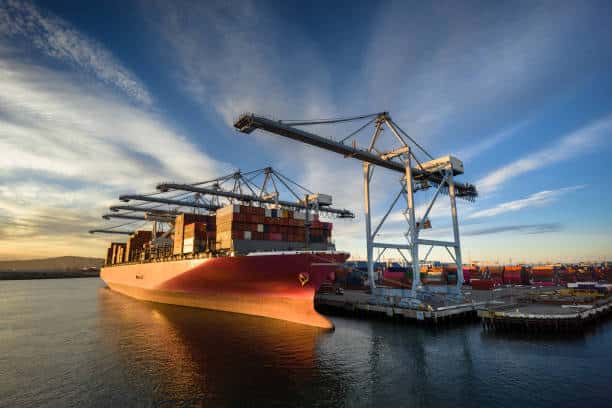
Major Chinese Ports for Exports to Nigeria
Selecting the right port in China is key for efficient exports to Nigeria. Shanghai, Shenzhen, and Guangzhou are top choices due to their advanced infrastructure and global reach.
- Shanghai Port – The busiest container port worldwide, offering top-tier logistics and global connectivity.
- Shenzhen Port – Features modern infrastructure and efficient handling, ensuring fast and reliable shipments.
- Guangzhou Port – Strategically located with access to multiple shipping routes, making shipping more cost-effective.
These ports provide advanced facilities, improving shipping efficiency. Choosing the right one depends on cargo type, location, and route preferences.
Major French Ports for Imports from China
Nigeria’s key import ports are Lagos (Apapa & Tin Can Island) and Onne, each critical for trade and logistics.
- Lagos Port (Apapa & Tin Can Island) – Nigeria’s busiest ports, handling most imports with well-established customs and logistics systems.
- Onne Port – A growing port specializing in oil and gas logistics while supporting general cargo imports.
Understanding each port’s capabilities helps businesses streamline customs clearance, reduce delays, and optimize shipping costs.
Freight Forwarders from China to Nigeria
Role of Freight Forwarders in the Shipping Process
Freight forwarders are key intermediaries in global shipping, ensuring smooth transportation from China to Nigeria. They manage logistics, simplify cross-border processes, and handle essential services like:
- Documentation processing – Ensures compliance with international shipping regulations.
- Customs clearance – Reduces delays and facilitates a seamless import process.
- Cargo tracking – Provides real-time updates for better shipment visibility.
For example, a freight forwarder can expedite customs clearance in Nigeria, minimizing delays and ensuring timely delivery.
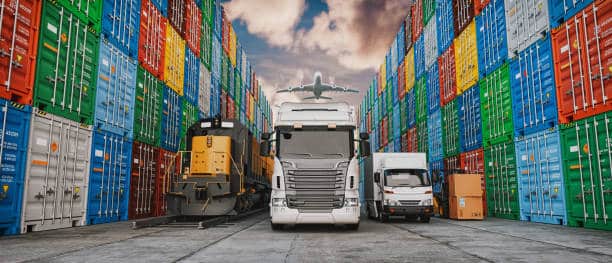
Selecting the Right Freight Forwarder for Your Needs
Choosing a reliable freight forwarder is crucial for efficient and cost-effective shipping. Key factors to consider include:
- Experience with China-Nigeria trade – Understanding route-specific challenges and solutions.
- Strong logistics network – Ensures flexible and reliable shipping options.
- Comprehensive services – Covers all aspects of shipping under one provider.
- Excellent customer support – Quick resolution of issues and seamless communication.
A well-chosen freight forwarder simplifies global trade, optimizing shipping efficiency and reducing risks.
How to Ship from China to Nigeria: A Step-by-Step Guide

Preparing Your Shipment: Documentation, Packaging, and Labeling
Proper documentation, packaging, and labeling are essential for smooth shipping from China to Nigeria. Attention to these details minimizes delays and ensures efficient customs clearance.
- Documentation – Key documents include the commercial invoice (details and value of goods), packing list (contents of each package), and bill of lading (receipt and shipping contract). Accuracy is crucial to avoid customs delays.
- Packaging – Secure packaging with durable materials protects goods from damage during transit. Consider handling conditions and environmental factors.
- Labeling – Labels must meet Chinese export and Nigerian import regulations. Clear descriptions, weights, and measurements speed up customs processing and reduce inspection risks.
Navigating Customs and Tracking Your Shipment
Understanding customs clearance and tracking your shipment ensures smooth logistics.
- Customs Clearance – Compliance with regulations is key. Use correct Harmonized System (HS) codes, calculate duties and taxes accurately, and ensure all paperwork is correctly filled out to avoid penalties or delays.
- Shipment Tracking – Real-time tracking tools from freight forwarders and couriers provide visibility. Monitoring shipments from departure to arrival helps manage expectations and adjust for potential delays.
Proper planning and execution help streamline the shipping process, reducing risks and ensuring timely delivery.
Alibaba and Shipping: Streamlining the Process
Leveraging Alibaba for Efficient LCL, FCL, and Door-to-Door Shipping
Alibaba has transformed global shipping, simplifying LCL, FCL, and door-to-door services. Businesses of all sizes can access flexible shipping solutions tailored to their needs.
- LCL & FCL Shipping – Alibaba helps businesses optimize costs by offering options for both small and bulk shipments.
- Door-to-Door Services – End-to-end logistics, including pickup, transit, customs clearance, and delivery, simplify shipping.
- Reliable Suppliers & Partners – Connecting directly with service providers enhances efficiency and cost-effectiveness.
Tips for Reducing Costs and Enhancing Efficiency through Alibaba
Optimizing shipping costs and operations on Alibaba can boost profitability.
- Choose the Right Shipping Mode – Understanding LCL, FCL, and door-to-door options helps align shipping with budget and timelines.
- Negotiate Rates – Alibaba’s competitive marketplace allows businesses to secure better pricing from suppliers and freight forwarders.
- Use Alibaba Logistics – Shipment tracking and management tools improve visibility and control over deliveries.
- Leverage Trade Assurance – Alibaba’s protection against delays, quality issues, and disputes ensures safer transactions.
By strategically utilizing Alibaba, businesses can streamline shipping from China to Nigeria while reducing costs and improving efficiency.





